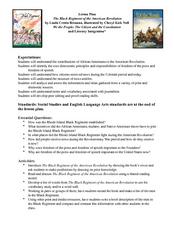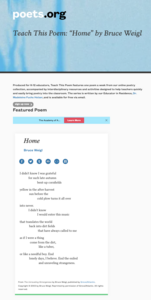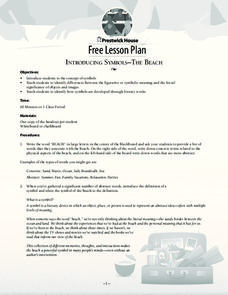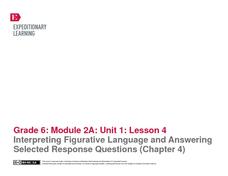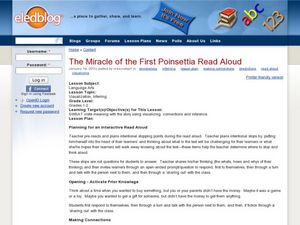Hong Kong Special Administrative Region
Learning English through Poems and Songs
Exposing learners to the power of words in poetry is a stimulating way to learn languages. Songs, haikus, rhyming words, and narrative works are all employed in a resource for teaching English as a Second Language.
Curated OER
Search Warranted?
Young readers work on evaluating claims in a piece of informational text with the article "In New York, It's Open Bag or Find Exits" from the New York Times. They analyze current search procedures implemented to fight terrorism...
Curated OER
We the People: The Citizen and the Constitution: The American Revolution
The contributions of African-Americans to the American Revolution are the focus of this Social Studies and language arts lesson plan. After reading and discussing Linda Crotta Brennan’s The Black Regiment of the American Revolution,...
Academy of American Poets
Teach This Poem: “Home” by Bruce Weigl
A poetry lesson takes a close look at home. Scholars discuss with partners what they are most grateful for at their homes. A timelapse video showcases potato tubers growing. While watching, pupils write down what they notice. Learners...
Institute of Electrical and Electronics Engineers
Stop and Go
It's "Green light, go!" with this lesson plan! STEM classes are illuminated with the history of traffic signals and how the engineering design has improved over time. They also learn about patents for new inventions. Finally, they...
Institute of Electrical and Electronics Engineers
Conveyor Engineering
Moving along the line. Class members research how a conveyor belt works in order to gain background information. Groups then design a conveyor belt that will carry a piece of candy four feet and along a 90-degree turn. The groups...
Elizabeth Murray Project
Gender and Opportunity in Colonial America
What was life like for women in Colonial America? What restrictions were placed upon them and what opportunities were they afforded? A case study of Elizabeth Murray offers high schoolers a chance to investigate primary source...
Albert Shanker Institute
Dream Under Development
As part of their study of the 1963 March on Washington, class members do a side-by-side comparison of the original text of Martin Luther King's "I Have a Dream Speech" with a transcript of the speech he delivered. The take away from the...
Prestwick House
Introducing Symbols–The Beach
Looking for a way to introduce class members to the concept of symbolism and multiple levels of meaning? Readers examine two different passages about the beach and consider how the writers use concrete objects, and places to...
UnboundEd Learning
Rosa Parks: The Mother of the Civil Rights Movement
Class members listen to a passage on Rosa Parks, examine images of the Montgomery Bus Boycott, and respond to questions based on the text. They then craft a free-verse poem that recounts her achievements and reveals why she is considered...
Curated OER
What's in a Name?
Build conversation skills for your English language learners in this spoken language development lesson plan. In it, learners listen to descriptions written by the teacher prior to the first day of class which include predictions about...
EngageNY
Text-Dependent Questions Text-Dependent Questions and Making a Claim: Digging Deeper into Paragraphs 12–14 of Steve Jobs’ Commencement Address (and connecting to Chapter 9)
Readers draw connections between Bud, Not Buddy and Steve Jobs' 2005 Stanford University commencement address and cite evidence from the two texts to support their analysis.
EngageNY
Interpreting Figurative Language and Answering Selected Response Questions (Chapter 4)
To prepare for an assessment of how well individuals are progressing with their ability to identify and analyze figurative language and its effect on tone and meaning, pairs work through Chapter Four of Christopher Paul Curtis'...
MENSA Education & Research Foundation
Hurricanes
Learn the ins and outs of hurricanes through a series of lessons answering, "What is a hurricane? How does it travel? How is one formed, measured, and named?" Information is presented through informative text and images, while...
Maryland Department of Education
The Concept of Identity Lesson 4: The Psychological Approach
Readers apply Sigmund Freud's theories of the unconscious mind and the psychological approach to literary criticism to analyze and evaluate the relationship between two characters in A Separate Peace.
EngageNY
Planning for Writing: Introduction and Conclusion of a Literary Argument Essay
After completing three body paragraphs of an argument essay about life's rules to live by from Bud, Not Buddy Christopher Paul Curtis, it's time to begin writing the introduction and conclusion. Independently, pupils draft the final two...
EngageNY
End of Unit 2 Assessment: Final Draft of Literary Argument Essay
Take the last step in writing a literary argument essay using Bud, Not Buddy by Christopher Paul Curtis in an activity focused on feedback. Using the stars and steps revision method, pupils consider teacher and peer feedback to revise...
EngageNY
Grade 9 ELA Module 1, Unit 2, Lesson 3
How do writers develop a central idea in a text? How can readers identify this central idea? These are the challenges class members tackle as they continue their analysis of "Letter One" from Rainer Maria Rilke's Letters to a Young Poet.
Pixton Comics Inc.
Elements of an Epic
Mythic heroes, gods and goddesses, and epic tales come alive as young artists craft their own graphic novel or mind map for classic epics, including The Odyssey, Beowulf, Harry Potter, and Star Wars, identifying the...
Literacy Design Collaborative
Analyzing the Development of Theme through Pivotal Moments
Liliana Heker's "The Stolen Party" and Martha Salinas' "The Scholarship Jacket" provide sixth graders with an opportunity to identify key scenes that authors use to develop their themes.
Curated OER
D.E.W. (Drop Everything and Write!)
Young scholars gather, determine validity and reliability of, analyze and organize information. They employ the most effective format for purpose and audience. Students write fully developed paragraphs that have details and information...
Curated OER
The Miracle of the First Poinsettia
Connecting to literature and learning how to infer are two great reading strategies everyone needs to know. Here, the class will read along with the story The Miracle of the First Poinsettia, review folktales as a genre, and make...
Curated OER
Literature Circle Role Descriptions
In this literature circle role descriptions worksheet, students identify the role they play in the literature circle. The different roles include: summarizer, vocabulary finder, questions writer, story mapper. Each role has three to...
Curated OER
Character Scrapbook Teacher's Guide
Students analyze a book's characters and create a scrapbook to print and save. In this on line interactive characterization lesson plan, students identify character traits and gain a deeper understanding of a book's characters.
Other popular searches
- Kindergarten Shared Reading
- Shared Reading Lesson Plans
- Shared Reading Lessons
- Shared Reading Owl Moon
- Shared Reading and Science
- Shared Reading Experience
- Shared Reading and Math
- Shared Reading Strategy
- Shared Reading Non Fiction
- Shared Reading Stellaluna
- Shared Reading Lessons Rome
- Shared Reading Inferences


